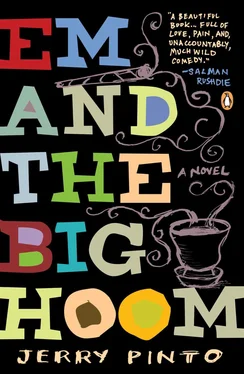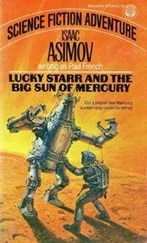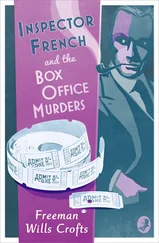Jerry Pinto - Em and the Big Hoom
Здесь есть возможность читать онлайн «Jerry Pinto - Em and the Big Hoom» весь текст электронной книги совершенно бесплатно (целиком полную версию без сокращений). В некоторых случаях можно слушать аудио, скачать через торрент в формате fb2 и присутствует краткое содержание. Год выпуска: 2014, Издательство: Penguin Books, Жанр: Современная проза, на английском языке. Описание произведения, (предисловие) а так же отзывы посетителей доступны на портале библиотеки ЛибКат.
- Название:Em and the Big Hoom
- Автор:
- Издательство:Penguin Books
- Жанр:
- Год:2014
- ISBN:нет данных
- Рейтинг книги:3 / 5. Голосов: 1
-
Избранное:Добавить в избранное
- Отзывы:
-
Ваша оценка:
- 60
- 1
- 2
- 3
- 4
- 5
Em and the Big Hoom: краткое содержание, описание и аннотация
Предлагаем к чтению аннотацию, описание, краткое содержание или предисловие (зависит от того, что написал сам автор книги «Em and the Big Hoom»). Если вы не нашли необходимую информацию о книге — напишите в комментариях, мы постараемся отыскать её.
Em and the Big Hoom — читать онлайн бесплатно полную книгу (весь текст) целиком
Ниже представлен текст книги, разбитый по страницам. Система сохранения места последней прочитанной страницы, позволяет с удобством читать онлайн бесплатно книгу «Em and the Big Hoom», без необходимости каждый раз заново искать на чём Вы остановились. Поставьте закладку, и сможете в любой момент перейти на страницу, на которой закончили чтение.
Интервал:
Закладка:
‘Forty per cent?’
‘It’s gone above that some years,’ he said briefly. I knew which years. The suicide years. ‘But mostly, it comes in a little less and allows for some flexibility.’
And finally we would come to the bank down the road.
‘This is to be kept in reserve,’ he would say. ‘For emergencies.’
At which point Em would say something like, ‘Over my dead body, please.’
This time, she was silent.
Then, as if girding herself up, she said, ‘There’s nothing left in that account.’
There was a moment of silence.
‘What?’ His voice was ordinary, his everyday voice.
‘I took it all out.’
‘When?’
‘I don’t know.’
He got up and went into the bedroom. In ten minutes, he came out dressed. He left without saying a word.
‘Oh shit,’ said Em.
‘What did you do?’
‘I don’t have to answer to you,’ she said.
This was true, of course. It wasn’t our money. But it was, in a way. In a terrible future way. It was difficult to point that out to her.
‘I hate this whole money shit,’ said Em. ‘Do you remember that Lawrence poem? You studied it in college. Something about a pound.’
‘The Madness of Money’ by D. H. Lawrence. I knew it well. We knew all our poems well. We learnt them by heart and we learnt the summaries by heart. We did not learn anything about poetry, but we could tell a metaphor from a metonymy. And I could quote at random:
‘I doubt if any man living hands out a pound note without a pang;/ and a real tremor, if he hands out a ten-pound note.’
‘So,’ said Em, as soon as I had finished, ‘what if I was testing myself? What if I thought, I shall write a cheque without a pang?’
‘Were you?’
‘No. But I’m going to see my mother.’
‘I don’t think you should,’ said Susan.
‘I think I should. Suppose he kills me?’ and here she gave a delicate stage shudder. We could see how worried she was, not because she really thought he would kill her, but because she had done something very wrong. Yet she was making it a performance, which was annoying.
‘Don’t be stupid,’ said Susan. ‘I’ll make a cup of tea.’
‘I love you forever,’ said Em. ‘But this is not the time for tea. It is time to write notes that say, “All is Discovered. Let us Flee.”’
‘Who to?’ I asked.
‘To Mae, who else?’
‘You gave her the money?’
‘I will not endure this interrogation from my own children,’ she said. ‘Oh where are my beedis?’
Susan pointed out that Em had them, as she always did, in the pocket of her housecoat. Em lit one and tried to hold on to being aggrieved but the pose cracked.
Finally, she said: ‘Should I run or should I stay?’
‘Where would you run to?’ asked Susan logically.
‘To my mother,’ Em replied.
‘Don’t be childish. That’s not even running.’
‘What would Angela Brazil have you do?’ I asked.
It was a stupid question but the Anglophile in my mother brightened.
‘Well, I think I should Stay the Course,’ she said. ‘And I should Face up to the Consequences. Then maybe I should put a gun in my mouth and shoot myself before I am blackballed at the club. But I don’t even have much luck at that.’
The wait wore us down, but in the end, she did not run. The Big Hoom came back and said nothing. Em tried to match his silence but could not. She kept breaking down and asking his forgiveness.
‘There’s nothing to forgive,’ he said each time and his voice was normal and terrifying.
After a little while when the pressure got to her, she changed around and started saying that it was her money too because the account had been in her name.
‘If you see it that way,’ he said.
Time inched along. I remember trying to read and failing. Susan was working on a crossword. Only The Big Hoom seemed to be going about as if nothing had happened. When you live in a small house, your lives intersect all the time. There’s no privacy, no way to conceal what is happening. Neither Susan nor I ever stormed off to our rooms and slammed the door and locked the world out, because neither of us had a room. Our lives were contained in a single bedroom and a single living room. There was a kitchen too and a toilet separated from the bathroom — which was an inordinate luxury — and four lives had to be managed within those walls. We had to live and love and deceive within earshot of each other.
‘I can’t tell you where the money went,’ said Em defiantly.
‘I can’t remember asking,’ he said.
‘Don’t be sarky,’ she said.
‘I’m sorry,’ he said.
‘No, I’m sorry,’ she said. She even meant it but it broke the storm.
‘You’re sorry? You’re sorry ? Is that all you can say? You break the faith and you say you’re sorry?’
‘What faith?’
‘The faith I have in you as a mother. The faith I have in you as a wife. The faith I have in you that you might have shifted some of your allegiance to this family.’
‘I have. I have. Oh why didn’t you listen to me and put me away when I told you to?’
It seemed like we were listening to an argument that was old and worn, being dragged out into the open. But I could not remember hearing this argument before. Could they have had it when we were asleep? I didn’t think so. Both Susan and I were light sleepers, attuned to Em’s emotional changes. If she started walking about too much, we woke up. When she spoke, we woke up. When she was lonely in the late night or in the early watches of the morning, all she had to do was start talking ‘to herself’ and one of us would be up sooner or later, crabby and irritable. ‘Why did you get up?’ she would ask disingenuously. ‘You need your sleep.’ ‘Shut up,’ Susan or I would say. ‘Make tea.’ And she would and we would begin to wake up and begin to talk. Sometimes, if we were very tired, she would send us back to bed and pretend to sleep herself.
During exam time, it was the unwritten rule that The Big Hoom would do the honours. Perhaps that was when they had discussed money?
Now The Big Hoom was looking at her in a way we had never seen. Not indulgently, not as a responsible brother looking at a younger sibling, not as the lover who seemed to ask for nothing in return, but as a trusting man injured in friendship, and surprised by the hurt.
‘You have?’ he asked quietly.
‘In what way have I not?’ demanded Em, though she sounded uncertain.
‘If I had fallen down dead and you had needed some money, what would you have done?’
‘I’d have asked Gunwantiben.’
There was a moment of silence. It was chilling.
‘You would? You would go out and beg?’
‘It wouldn’t be begging. It would be a loan.’
‘A loan? A loan like the ones your family has taken? It has a history of loans. And everyone plays along when they actually know that you people are begging.’
‘Begging?’
‘What do you think it is when you take a loan, then you take another loan, and you pay some of the first loan with the second? What do you think it is when someone gives you money and then writes it off? It’s called begging.’
‘Gunwantiben would not…’
‘I am not talking about Gunwantiben. I am talking about you. I am talking about you turning your children into beggars. I am talking about how you cannot be trusted to keep even a single account inviolate.’
‘I needed the money.’
‘You needed the money?’
And then he suddenly looked across at the two of us transfixed by this discussion and seemed to decide that it was not worth it.
‘I am sure you needed the money,’ he said, without expression.
‘Don’t act like that.’
Читать дальшеИнтервал:
Закладка:
Похожие книги на «Em and the Big Hoom»
Представляем Вашему вниманию похожие книги на «Em and the Big Hoom» списком для выбора. Мы отобрали схожую по названию и смыслу литературу в надежде предоставить читателям больше вариантов отыскать новые, интересные, ещё непрочитанные произведения.
Обсуждение, отзывы о книге «Em and the Big Hoom» и просто собственные мнения читателей. Оставьте ваши комментарии, напишите, что Вы думаете о произведении, его смысле или главных героях. Укажите что конкретно понравилось, а что нет, и почему Вы так считаете.











